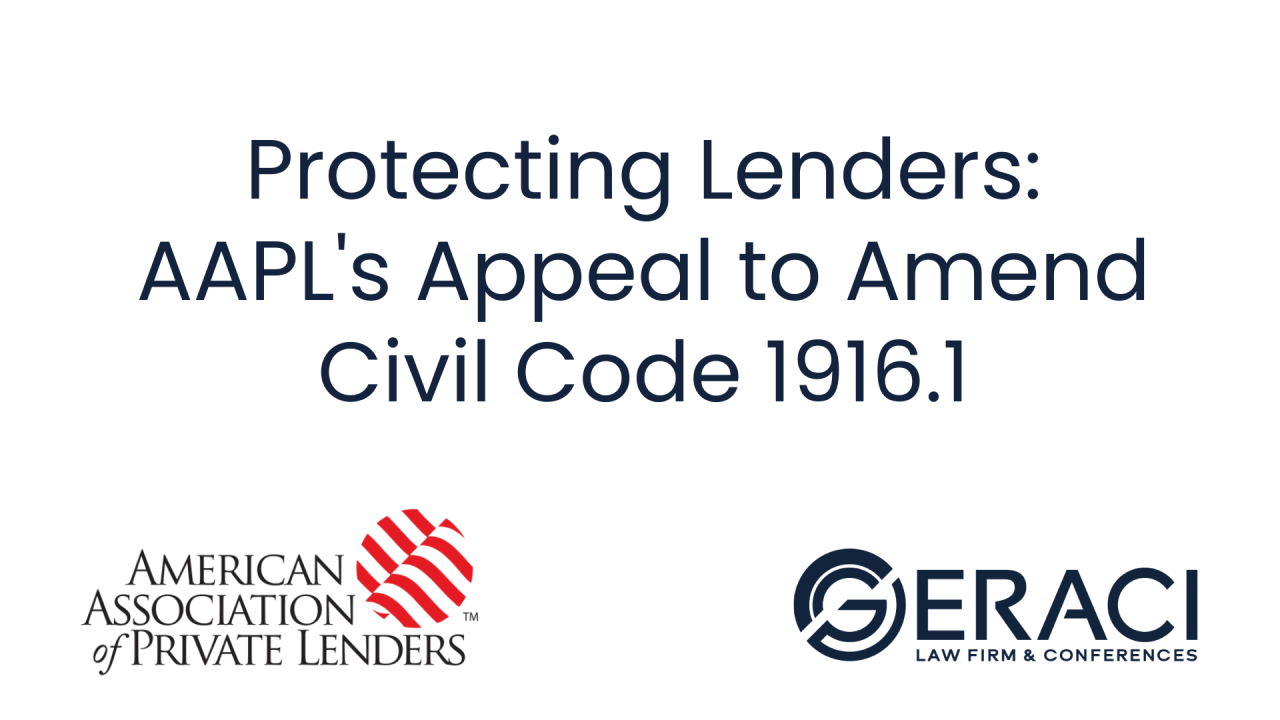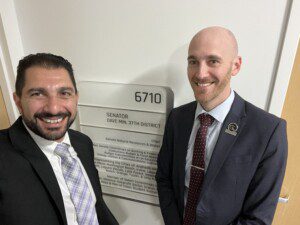This article was updated 7.1.25 to reflect a business name change.
On April 23rd 2024, members of the American Association of Private Lenders wrote to Assemblymember Kate Sanchez regarding the challenges posed by a recent court ruling affecting loan modification laws in California. The letter addressed the ambiguity in usury exemptions for loans arranged by licensed real estate brokers and proposed a modification to clarify the statute. You can find the full letter below:
Dear Assemblymember Sanchez,
American Association of Private Lenders (AAPL) is an association of non-depository lending organizations who make non-consumer loans secured by real estate throughout the country. AAPL’s mission is to advocate on behalf of private lenders and set best practices for its members.
AAPL’s members primary focus is to providing financing to real estate investors who seek to add value and density to existing housing stock, and the development of new housing stock. Real estate investors seek private lenders in these circumstances as most depository institutions are unable or unwilling to provide short-term financing options to real estate investors who may need to commit significant capital improving the property to make it inhabitable or otherwise increase the density of the property, typically requiring significant construction. AAPL members are quite active in the state of California with many members headquartered in the state and more than 16,000 mortgage loan transactions by private lenders in 2023 totaling more than 5 billion dollars in loans provided to residents of the State.
Article XV of the California Constitution generally limits the interest rate for loans to 10% per annum. An exemption in the Constitution is given to any loan secured by real property which is made or arranged by a licensed California real estate broker; further codified and expanded upon under California Civil Code 1916.1. This constitutional and statutory exemption is critical, particularly in today’s high interest rate environment as private lenders take on significant risk when providing financing for construction loans. Lightning Docs, LLC a loan document system for private lenders, ran an analysis of 3987 private loans ($2.4BN of loans) in California from January 1, 2023 to March 31, 2024 with an average interest rate of 11.08%.
However, when the legislature amended this statute in 1985, they made an odd but unique distinction between arranging a new loan and modifying or forbearing an existing loan. Recently, a 9th Circuit ruling in the case of In Re Moon reviewed this statute. The case involved a loan which was arranged by a licensed real estate broker and therefore exempt from usury. The lender subsequently modified the loan and reduced the interest rate. The court determined that the modification which reduced the interest rate made the loan usurious.
The Court’s decision is based on Civil Code Section 1916.1 which states in pertinent part: “…Article XV of the California Constitution shall not apply to any loan or forbearance made or arranged by any person licensed as a real estate broker by the State of California, and secured, directly or collaterally, in whole or in part by liens on real property. For purposes of this section, a loan or forbearance is arranged by a person licensed as a real estate broker when the broker:…(1) acts for compensation or in expectation of compensation for soliciting, negotiating, or arranging the loan for another…(3) arranges or negotiates for another a forbearance, extension, or refinancing of any loan secured by real property in connection with a past transaction in which the broker had acted for compensation or in expectation of compensation for selling, buying, … of real property….”
The Court read the first subdivision as pertaining only to “loans” and thus not forbearances or extensions, and the only time a forbearance or extension would be exempt from, the purchase and sale broker has nothing to do with the financing of the property. Moreover, even if they did, it does not usury would be when it was arranged by a licensed broker who was involved in the purchase or sale of the property. As a preliminary matter make any sense to require the original broker to the purchase or sale to be involved as that person may have retired, deceased or otherwise unable or unwilling to be involved.
We believe the intent of the legislature was to create a usury exemption for any loan, extension, or forbearance which is arranged by a licensed real estate broker. Unfortunately the existing language has proven to be ambiguous. Accordingly, we believe a simple amendment to the statute would match with the California Constitution and the actual intent of the legislature.
The following is an example of a modification which could be made to Civil Code 1916.1 which would further this purpose.
The restrictions upon rates of interest contained in Section 1 of Article XV of the California Constitution shall not apply to any loan or forbearance made or arranged by any person licensed as a real estate broker by the State of California, and secured, directly or collaterally, in whole or in part by liens on real property.
The effect of these court rulings has sent shockwaves through the community. Until and unless Civil Code 1916.1 is modified, lenders are unfortunately in a position where they are no longer able to modify their loans without risking making them usurious. Mortgage lenders should be encouraged to modify and otherwise forbear on loan obligations as the alternative would be to foreclose on their borrowers which is a lose-lose for the borrower and the lender which cannot reasonably be the intent of the legislature.
Sincerely,
—
Last week, AAPL‘s General Counsel Matthew Gunter and Nema Daghbandan with Fortra Law traveled to Sacramento to speak with legislators about fixing the California loan modification challenges after the In re Moon decision. In Re Moon holds that an unlicensed lender can make a previously non-usurious loan usurious with the sole action of modifying the loan (even if they reduce the interest rate). With this court interpretation, a legislative fix is now the only path forward.
Nema and Matt were able to speak with California Committee on Banking and Finance members and provide a letter addressing the issue with sample language to fix the law (see post for letter).
AAPL has been involved in this fight from day one, filing multiple Amicus Briefs with the courts to explain why this interpretation should be overturned.
Stay tuned for how you can help get this legislative fix in place. For AAPL members who have CA loan modification questions after In Re Moon, please connect with Matt Gunter.
To learn more about the In re Moon case and get the latest updates from Nema Daghbandan and Matthew Gunter, follow the link here: https://fortralaw.com/loan-modifications-in-peril-in-california/












Leave A Comment